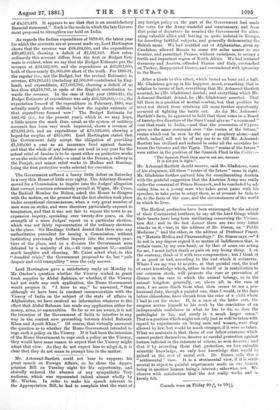The Medical profession have been encouraged, by the advent of
their Continental brethren, to say all the hard things which their hearts have long been meditating concerning the Vivisec- tion Act ; and in the last Lancet there are two very bitter attacks on it,—bne, in the address of Dr. Simon, on " Public Medicine ;" and the other, in the address of Professor Fraser, on " Materia Medico. and Pharmacology." Dr. Simon says :—" I do not in any degree regard it as matter of indifference that, in certain cases, by my own hand, or by that of some one acting for me, I must inflict death or pain on any living thing. I, on the contrary, think of it with true compunction ; but I think of it as good or bad, according to the end which it subserves. Where I see my way to acquire, at that painful cost, the kind of exact knowledge which, either in itself or in contribution to our common stock, will promote the cure or prevention of disease in the race to which the animal belongs, or in the animal kingdom generally, or, above all, in the race of man, I no more flinch from what then seems to me a pro- fessional duty, though a painful one, than I would, in the days before chloroform, have shrunk from the cries of a child whom I had to cut for stone. If, in a case of the latter sort, the surgeon nerves himself to his work by the conviction of an indispensable usefulness in what he has to do, so does the pathologist in his, and surely in a much larger sense." That is a position which might not only just as well be taken with regard to experiments on living men and women, were they allowed by law, but would be much stronger, if it were so taken. What we maintain is that those of our fellow-creatures which cannot protect themselves, deserve as careful protection against torture inflicted in the interests of others, as men deserve ; and that if by according them that protection, we lose valuable scientific knowledge, we only lose knowledge that would be gained at the cost of moral evil. Dr. Simon calls this a "sentimental" view. It is a sentimental view, if it is send. mental to object to painful experiments made on one human being in another human being's interest; otherwise, not. We observe with satisfaction that the Act really works and is keenly felt.






























 Previous page
Previous page